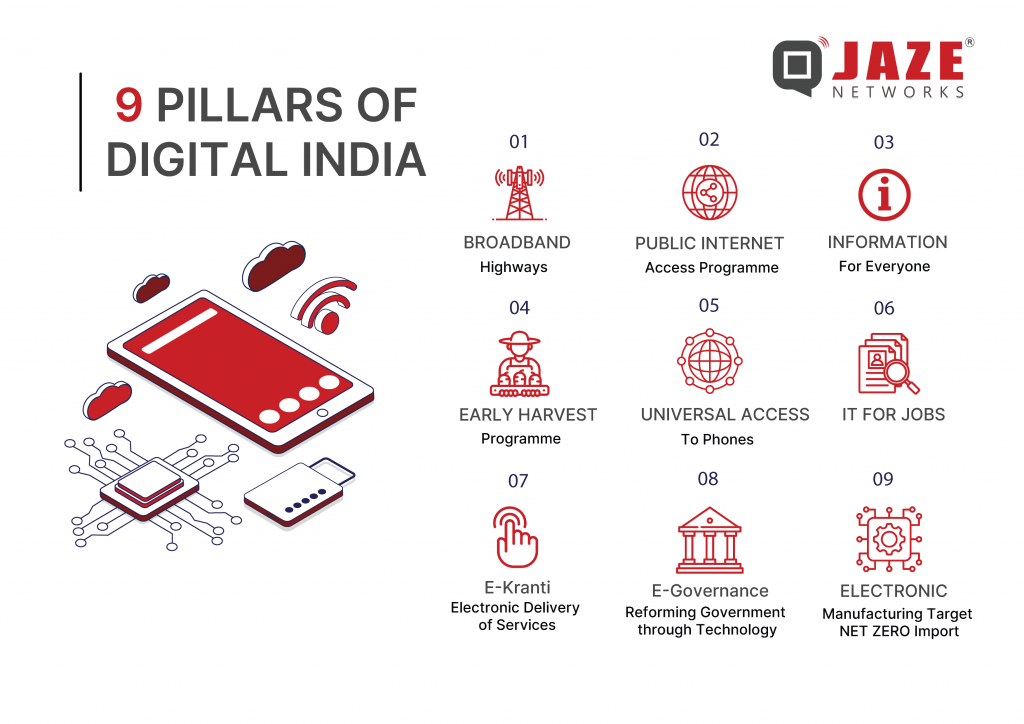




Launched in 2015, the Digital India Scheme is a transformative initiative by the Indian government aimed at building a digitally empowered society and knowledge economy. The program emphasizes three core areas: delivering robust digital infrastructure, offering government services on-demand, and empowering citizens through digital literacy. With high-speed internet as its backbone, the initiative aspires to bridge the digital divide, stimulate innovation, and foster inclusive growth.
The Digital India Scheme revolves around three key areas:

The scheme is built on nine key pillars that drive its mission:
Among these pillars, broadband highways are integral to the program’s success. High-speed internet serves as the backbone for delivering essential services, bridging the urban-rural divide, and fostering economic growth.
The scheme digitizes government services to enhance accessibility. Aadhaar, a unique digital identity, serves as a single authentication point for citizens, streamlining access to various services.
Broadband-enabled CSCs act as hubs for government and private services, including banking, insurance, and digital literacy programs, particularly benefiting rural populations.
With reliable internet connectivity, digital payment systems like Unified Payments Interface (UPI) facilitate secure and efficient transactions, promoting a cashless economy.
Broadband penetration into rural India is one of the most important aspects of the Digital India project which acts as an enabler of other services. The Government of India has deployed a vast network of fiber throughout the country through BHARATNET to connect all Gram Panchayats and villages. Each state has its own special purpose vehicle to make use of the fiber to deliver broadband and other services as part of Digital India.
Broadband delivery requires a complete AAA and BSS solution which integrates with all other components in the network. Jaze ISP Manager delivering an end-to-end solution with comprehensive BSS and AAA solution for broadband delivery across Tamil Nadu through TANFINET. The solution is delivered to be scalable to serve 1 million subscribers delivering high-speed broadband and other services across Tamil Nadu. Click here to learn more.
The modern internet is powered by a vast network of interconnections, enabling seamless data flow between different networks worldwide. One crucial element in this system is Internet Exchange Points (IXPs), which facilitate efficient data exchange between Internet Service Providers (ISPs) and other network operators.
An Internet Exchange Point is a physical location where multiple networks, including ISPs, content delivery networks (CDNs), and other internet-related organizations, connect and exchange traffic. Instead of routing data through third-party transit providers, networks use IXPs to communicate directly. This direct exchange reduces the distance data must travel, improves speed, and minimizes latency.
For example, when two ISPs connect through an IXP, they can transfer data between their networks more quickly and efficiently than if the data traveled through multiple intermediate networks.
At an IXP, networks connect their infrastructure, such as routers and switches, to a shared switching fabric. This setup allows them to exchange routing information and transfer data through direct peering agreements. Typically, networks participating in IXPs use the Border Gateway Protocol (BGP) to manage routing and determine optimal paths for data transfer.
IXPs play a pivotal role in optimizing the global internet infrastructure. By concentrating traffic exchange at specific locations, they reduce the burden on backbone networks and enhance the efficiency of internet traffic delivery.
Additionally, IXPs foster innovation by enabling content providers, ISPs, and enterprises to collaborate. For instance, large-scale streaming services and CDNs rely heavily on IXPs to ensure reliable and high-quality content delivery to users worldwide.
Despite their advantages, IXPs face challenges such as congestion during peak traffic periods and the need for continuous upgrades to handle increasing data volumes. Additionally, establishing an IXP requires cooperation between various stakeholders.
Internet Exchange Points are the backbone of a fast, reliable, and cost-efficient internet. They empower networks to deliver better services while reducing operational costs and fostering global connectivity. As internet usage continues to grow, IXPs will remain essential in ensuring a seamless online experience for users.
IXPs facilitate the interconnection between streaming providers and end-user networks via ISPs, reducing latency and providing a smoother viewing experience. Jaze ISP Manager enables ISPs to set policies that optimize the use of IXPs through supported BNGs, ensuring lower transit costs and an improved Internet experience for end-users. Click here to learn more.
As of 2023, TRAI has highlighted quality of service (QoS) issues as a persistent concern among Indian consumers, with complaints regarding network disruptions, inconsistent speeds, and hidden fees. TRAI receives thousands of complaints monthly, which indicates widespread dissatisfaction with service quality and transparency in ISP billing practices.
A reliable internet connection is as essential as electricity in today’s digital age. Complaints about poor service quality, hidden charges, and inconsistent speeds are widespread. Understanding if you’re getting your money’s worth from your ISP is crucial. Let’s dive into the ways to determine if your ISP is delivering on its promises.
India’s internet landscape shows a stark contrast in accessibility between urban and rural areas. While urban consumers enjoy more ISP options and higher speeds, rural areas still struggle with connectivity. The rural broadband penetration rate is significantly lower than urban, as per TRAI reports, making it challenging for rural consumers to switch to better providers or find competitive prices. This disparity limits consumer choices and leads to dissatisfaction among rural users, who feel locked into subpar services due to a lack of alternatives.
As India’s internet needs grow, consumers deserve ISPs that provide transparent pricing, reliable speeds, and better access across the country.
Jaze ISP Manager helps ISPs streamline operations with feature-rich and configurable modules including lead management, helpdesk, customer portals and mobile applications in order to help serve customers better. These features ensure reliable service delivery and support to provide a great customer experience. Click here to know more.